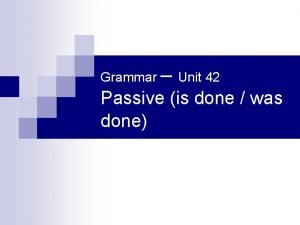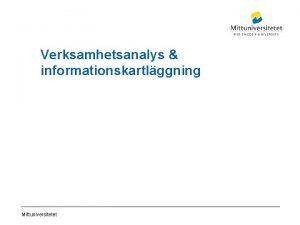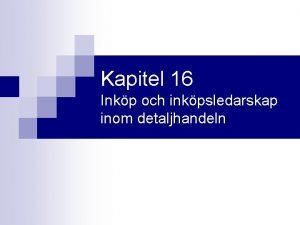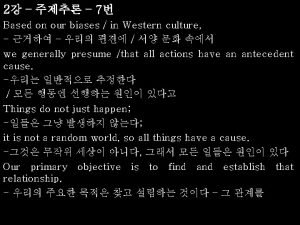Machiavellianism He who neglects what is done for




















- Slides: 20

Machiavellianism “He who neglects what is done for what ought to be done, sooner effects his ruin than his preservation. ”

Outline • Background: • Machiavelli the man • The Prince • Characteristics of Machiavellianism • Usefulness of the Construct • Mach Instruments • Mach IV/V • Mach B • MPS

Machiavelli • Lived during the 1500 s • Renaissance • Political writer / philosopher • Sought to describe political life as it really was, that is to understand it rationally • Most famous work: • The Prince

Machiavelli and The Prince • First work of modern philosophy • Practical guide for ruling • How to gain and keep power • General themes: • The ends justify the means • Unethical behavior is acceptable, even necessary, if it helps attain goals or protect political position. • Better to be feared than loved, if you cannot be both • Prince (leader) may be perceived to be merciful, faithful, humane, frank, and religious, but most important is only to seem to have these qualities.

What is Machiavellianism? • “Conceptualized as one’s propensity to distrust others, engage in amoral manipulation, seek control over others and seek status for oneself” (Dahling, Whitaker, &Levy, 2009). • Leadership: unethical behavior is acceptable, even necessary, if it helps attain goals or protect political position. -OR • Leadership as a pursuit that serves the needs of the common good rather than self-interest • Taking a realistic view of leadership: you do what needs to be done

Four General Characteristics: 1. A relative lack of affect in interpersonal relationships (lack of empathy for others). 2. A lack of concern with conventional morality (utilitarian rather than moral view) 3. A lack of gross psychopathology (instrumentalist rather than rational view of others) 4. Low ideological commitment (focus on task completion rather than long-range ideological goals)

Usefulness of Machiavellianism as a Construct • Many scholars have adopted the perspective of Machiavelli to examine and understand political dynamics in organizations • High levels of Machiavellianism has been tied to (Dahling, Whitaker, & Levy, 2009): • • Theft Economic opportunism Influence tactics (strategic self-disclosure & ingratiation) Low levels of job satisfaction Low levels of helping behavior More legal and management careers Personality characteristics: charismatic, adaptable, unsupportive

Scales: • Mach Instruments: • Mach IV/V • Cognitive • Mach B • Behavioral • MPS • Mix: cognitive/behavioral

Mach IV/ V • Christie and Geis (1970) • 20 -item Likert scale that assess adults ages 18 -65 years. • Developed to measure political personality orientation of leaders in organizations. • Political personality: “a disposition in which formal and informal power is used to control and/or manipulate others” (Christie & Geis, 1970). • Three distinct constructs were identified: interpersonal tactics, cynical views, and abstract morality. • Questions were pulled directly from The Prince: • “Most men forget more easily the death of their father than the loss of their property” • Mach V: 10 -item forced choice

Psychometrics: Mach IV • Inconsistent reliability (split-half): • Large variability in scale reliability across demographic groups • Men: . 73 • Women: . 39 • Internal consistency coefficients: • . 59 -. 88 • Validity • No significant correlation with other measures: IQ tests and measures of authoritarianism • Distinct construct • Overall, low levels of reliability warrant concern • What could affect reliability?

Other Issues • Poor Items— • Items are double-barreled • E. g. , "All in all, it is better to be humble and honest than to be important and dishonest. ” • May evoke defensiveness • Items are needlessly controversial, and better wording could have been used • Dimensionality: Mixed results • Three purported, two found: interpersonal tactics and cynical views • Some found five unique dimensions, while others found a single dimension • Panitz (1989) states, "The issue is not whether Machiavellianism is a single or multidimensional construct, but whether the construct is measurable using the Mach IV scale” • Any issues with defining the construct validity of this instrument?

Mach B • Aziz and Meeks (1990) • The Machiavellian Behavior • Behaviorally examines interpersonal situations in contrast to measuring cognitive constructs • Utilizes scenarios designed to be behavioral manifestations of Machiavellianism • Psychometrics: • Alpha of. 70 -. 88 • Single factor emerging from the factor analysis • Studies have found that this scale correlates with sales performance, while Mach IV does not

Machiavellian Personality Scale (MPS) • Dahling et al. (2010) • Conceptualization of Machs includes dimensions of observable behaviors, internal beliefs, and motivations • 5 -point Likert scale with 16 items that cover four dimensions: • • Tendency to distrust others Willingness to engage in amoral disruptions Desire for status Desire to maintain interpersonal control

Four Dimensions • 1. Distrust of others: Cynical outlook on the motivations and intentions of others with a concern for the negative implications that those intentions have for the self. • 2. Amoral Manipulation: a willingness to disregard standards of morality and see value in behaviors that benefit the self at the expense of others. • They are selectively willing to deviate from moral standards when the opportunity for gain presents itself

Four Dimensions • 3. Desire for control: a need to exercise dominance over interpersonal situations to minimize the extent to which others have power. • 4. Desire for status: desire to accumulate external indicators of success • Not intrinsically motivated • Measure success in terms of extrinsic goals

MPS: Reliability and Validity • Good reliability • α =. 82 • Convergent Validity: compared with political skill, selfmonitoring, narcissism, and need for achievement measures • Only narcissism and NACH supported, explained 26% and 27 % of the variance, respectively • Discriminate validity: wasn’t related to GMA or NACH-E (need for achievement excellence) • Criterion-oriented Validity: • Negatively related to self-reported levels of job satisfaction • Positively related to CWBs

Conclusions • Unclear whether Machiavellianism is a dispositional characteristic or a behavioral preference • Measures of Machiavellianism could be useful in applied settings as a tool for understanding behavior: • Mach relates to major CWBs, • Potential to help identify individuals especially prone to incivility, bullying, theft, etc. • Machs tend to be dissatisfied with their job • Tool to understand who may be especially prone to frequent turnover

Conclusions • Could utilize for placement decisions: • The ability to make unpopular decisions in order to preserve the common good for the organization (integrity) • The ability to decipher situations in which it is more important to be feared than loved in order to meet a goal (authority) • The ability to be flexible by accurately assessing which actions will meet with the highest success (selfmonitoring)

Questions?

Discussion Question • Do you think Machiavellianism has a place in today's business environment? Why?
 Paulhus suits
Paulhus suits What is machiavellianism
What is machiavellianism Machiavellianism
Machiavellianism Advantages of cutter mill
Advantages of cutter mill Aldanma cahilin kuru lafına
Aldanma cahilin kuru lafına Unit 42 passive 1 (is done / was done)
Unit 42 passive 1 (is done / was done) Anatomi organ reproduksi
Anatomi organ reproduksi Boverket ka
Boverket ka Strategi för svensk viltförvaltning
Strategi för svensk viltförvaltning Typiska drag för en novell
Typiska drag för en novell Verksamhetsanalys exempel
Verksamhetsanalys exempel Tack för att ni har lyssnat
Tack för att ni har lyssnat Klassificeringsstruktur för kommunala verksamheter
Klassificeringsstruktur för kommunala verksamheter Centrum för kunskap och säkerhet
Centrum för kunskap och säkerhet Läkarutlåtande för livränta
Läkarutlåtande för livränta Påbyggnader för flakfordon
Påbyggnader för flakfordon Tack för att ni lyssnade
Tack för att ni lyssnade Inköpsprocessen steg för steg
Inköpsprocessen steg för steg Egg för emanuel
Egg för emanuel En lathund för arbete med kontinuitetshantering
En lathund för arbete med kontinuitetshantering Atmosfr
Atmosfr




































